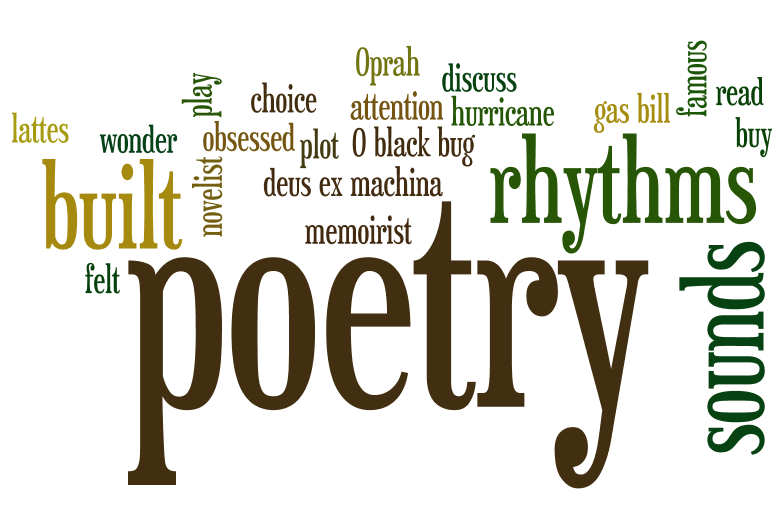Obsessed With Words
Brad Fruhauff
On October 3 and 10 Relief poetry editor Tania Runyan visited EIC Brad Fruhauff's intro to poetry class. After some great discussion, the students had more questions, which Tania agreed to respond to in blog form here. Q: In the interview in Relief 6.1 you describe yourself as "obsessed with words." Can you say more about that?
Tania: With novelists and memoirists receiving all the attention these days (okay, most days for the past hundred years or so), it’s a wonder anyone interested in paying the gas bill would choose poetry as his or her genre. We poets are happy if we break one million in Amazon sales ranks and often find ourselves staring, mystified, at the Oprah Book Club symbol gracing books in actual stores. Books that people buy, read, and discuss over lattes.
 As a kid, I wanted to be one of those famous writers—playwright, specifically (cause they’re the most famous, right?). In fact, I took screenwriting courses as a teen and began my creative writing major with an emphasis in playwriting and theatre. But the more I banged away at my stories and scenes, the more I found myself wanting to spend even more time on my poetry workshops. Yes, I relished the process of describing settings and characters or crafting perfectly timed dialogue. However, when it came time to draft poems, I willingly, enthusiastically spent up to half an hour per line trying out the sounds and rhythms of different words. In fact, I would read these lines to myself repeatedly in the campus commons—and these were pre-Bluetooth days, so it was old school weird. And even though I often spent much more time on a poem than a short story, the process wasn’t stressful. I reveled in the possibilities of language and the incredible power one word or syllable could hold over the overall effect of a poem. There was no going back. I was doomed to become a smitten, penniless poet.e. Plot, however, was the albatross around my neck. It required too much logic, like a trigonometry problem. I had such difficulty coming up with a climax for my senior play project that I resorted to bringing in a ridiculous hurricane as the deus ex machina. I still cringe at how unnaturally the whole play unfolded as I watched students from the theatre department stumble through it on stage.
As a kid, I wanted to be one of those famous writers—playwright, specifically (cause they’re the most famous, right?). In fact, I took screenwriting courses as a teen and began my creative writing major with an emphasis in playwriting and theatre. But the more I banged away at my stories and scenes, the more I found myself wanting to spend even more time on my poetry workshops. Yes, I relished the process of describing settings and characters or crafting perfectly timed dialogue. However, when it came time to draft poems, I willingly, enthusiastically spent up to half an hour per line trying out the sounds and rhythms of different words. In fact, I would read these lines to myself repeatedly in the campus commons—and these were pre-Bluetooth days, so it was old school weird. And even though I often spent much more time on a poem than a short story, the process wasn’t stressful. I reveled in the possibilities of language and the incredible power one word or syllable could hold over the overall effect of a poem. There was no going back. I was doomed to become a smitten, penniless poet.e. Plot, however, was the albatross around my neck. It required too much logic, like a trigonometry problem. I had such difficulty coming up with a climax for my senior play project that I resorted to bringing in a ridiculous hurricane as the deus ex machina. I still cringe at how unnaturally the whole play unfolded as I watched students from the theatre department stumble through it on stage.
I remember my first poetry assignment in college: write an ode to something that normally wouldn’t deserve praise. I chose a flea and still remember my first line: “O black bug of borrowed blood.” That line ran through my head for weeks, so simple but addicting in its sonic power. Today, I still enjoy traveling the long, quiet distances to finding the exact word needed to make the poem “click,” as Yeats said, “like the closing of a box.”
Crazy public mumblings aside, I wish, as a poetry editor, that more poets obsessed over their words. I often read poems that overflow with compelling emotions and ideas but lack the musical glue of carefully chosen words and well-crafted lines. A poet should rarely stick to the “first word that comes to mind.” Indeed, sometimes the first word does end up becoming the last, but that choice should be made only after allowing some exploration into different connotations and sounds—combinations that evoke surprise, several layers of meaning, or even just the sheer pleasure of certain words crashing together. Poems deserve our obsession. By definition, they are “made things” that should not only be felt, but built. Readers deserve the careful construction that allows them, as Billy Collins writes, to “walk inside the poem’s room.”
Poetry is a hard job, but no one has to do it. We do it not for love of ourselves but for love of the well-chosen word that travels beyond ourselves.
Tania Runyan is poetry editor for Relief and an editor for Everyday Poems. She has published two books of poems, Simple Weight (Finishing Line Press) and A Thousand Vessels (WordFarm). She is also the recipient of an NEA grant.